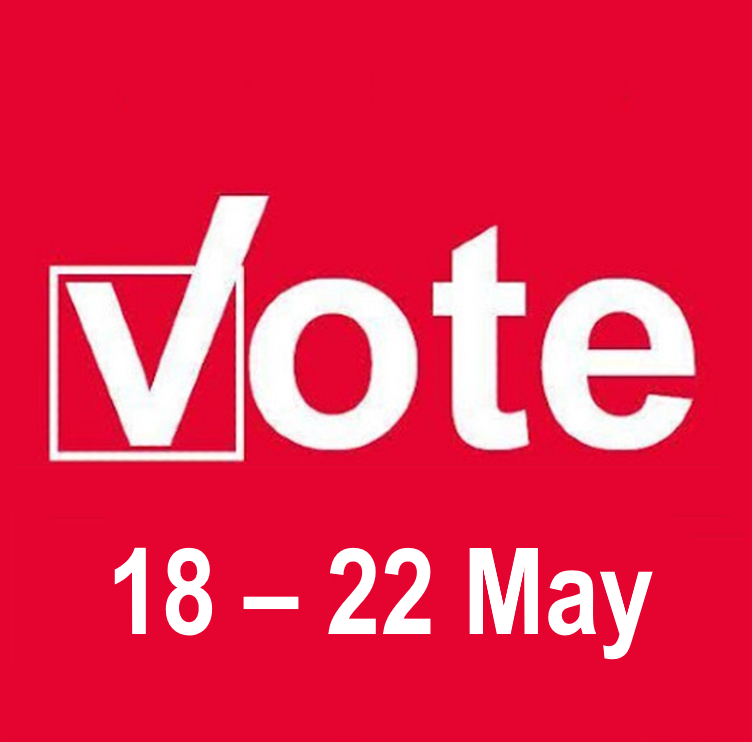Verkiezingen 2026

Van 18 mei tot en met 22 mei 2026 vinden de universitaire verkiezingen plaats
voor de studentengeleding van de Universiteitsraad en de Faculteitsraden
als ook voor de personeelsgeleding van de faculteit Religie, Cultuur en Maatschappij (RCM), van de faculteit Economie en Bedrijfskunde (FEB), van Campus Fryslân en van het Centrum voor Informatie Technologie (CIT) .
Stel jij je verkiesbaar?
Ben jij geïnteresseerd om lid te worden van de één van de medezeggenschapsraden van de RUG? Voor het volgende academisch jaar zijn alle partijen nu op zoek naar hun opvolgers!
Meld je aan!
Wil je je verkiesbaar stellen voor een faculteitsraad? Neem dan contact op met de raad van jouw faculteit: faculteitsraden.
Als je je verkiesbaar wilt stellen voor de U-raad, mail dan voor 20 februari naar één van de partijen. Het is ook mogelijk om je eigen partij op te richten. In dat geval kun je een mail sturen naar het Centraal Stembureau via csb rug.nl. Doe dit uiterlijk 24 maart 2026.
Wat doet de Universiteitsraad?
De Rijksuniversiteit Groningen (RUG) heeft een Universiteitsraad. Deze 'U-raad' (UR) bestaat uit vierentwintig leden: twaalf die uit en door studenten worden gekozen en twaalf uit en door het personeel. Studentenverkiezingen vinden elk jaar plaats. Personeelsleden worden voor twee jaar gekozen.
De UR-leden samen vertegenwoordigen de academische gemeenschap. De Universiteitsraad is het hoogste democratisch verkozen orgaan in de universiteit.
De Universiteitsraad heeft als belangrijke taak het College van Bestuur te controleren. Dat betreft zaken als de jaarlijkse universiteitsbegroting, plannen voor nieuwbouw en verbouw, internationalisering, onderwijsvernieuwingen, investeringen in onderzoek en de strategische agenda. De UR heeft instemmingsrecht en stemt over voorstellen van het College van Bestuur.
De partijen
In de Universiteitsraad zijn er meerdere studentenpartijen actief.
De partijen die in de faculteitsraden deelnemen, kun je vinden op de facultaire webpagina.
Het aantal zetels per partij wordt elk jaar verdeeld, tijdens de universitaire verkiezingen in mei.
Wat doen de faculteits- en dienstraden?
De faculteitsraad is na de Universiteitsraad het belangrijkste medezeggenschapsorgaan in de universiteit. De faculteitsraad controleert het faculteitsbestuur en heeft instemmings- en adviesrecht op bepaalde onderwerpen, zoals op onderdelen van de Onderwijs- en Examenregeling (OER). De raad vertegenwoordigt studenten en medewerkers en is gesprekspartner voor het faculteitsbestuur.
Universitaire diensten kennen dienstraden. Deze bestaan uitsluitend uit personeelsleden, die worden gekozen uit en door de medewerkers van de betreffende dienst. De dienstraad controleert de directie en heeft instemmings- en adviesrecht op bepaalde onderwerpen. University Services, de Universiteitsbibliotheek en het Centrum voor Informatie Technologie hebben een dienstraad.
Tijdpad
Dit betreft informatie over de verschillende stappen in het verkiezingsproces en over de verkiezingen zelf.
21 januari | Aankondiging van de verkiezingen
Op 21 januari 2026 informeert het Centraal Stembureau (CSB) een ieder die het betreft over de verkiezingen.
4 t/m 6 februari | Inzage kiezersregister en verzoek om verbetering
Het kiesrecht is vastgelegd in het Kiesreglement. Studenten en personeel die mogen stemmen worden opgenomen in het kiezersregister van de betreffende geleding en raad.
Dit jaar wordt op 3 februari 2026 het kiezersregister vastgesteld. Op dat moment moet je als student ingeschreven staan of als medewerker in dienst zijn bij de RUG om in mei te mogen stemmen.
Vanaf 4 tot en met 6 februari kunnen de eigen gegevens in het Kiezersregister worden ingezien met de blauwe knop "inzage kiezersregister". (Alleen zichtbaar in deze periode). Iedereen ontvangt hiervoor een mail.
Meer informatie over het Kiezersregister vind je in het Kiesreglement met daarin bijlage 2 over de Kiesgerechtigden.
16 t/m 25 maart | De kandidaatstelling
Vanaf 16 maart tot en met 25 maart 2026 kun je je kandidaat stellen voor de verkiezingen. De indieners van deelnemende partijen voeren hun kandidaten in in de digitale stemapplicatie. Kandidaten moeten hun kandidatuur vervolgens in dezelfde periode bevestigen. Na 25 maart is de lijst definitief en beslist het Centraal Stembureau over de geldigheid.
Vanaf 23 februari 2026 kun je de officiële Bekendmaking nr. 2 | Kandidaatstelling hieronder vinden.
2 april | Partijen en Kandidaten
De kandidatenlijst voor de verkiezingen wordt op 2 april 2026 vastgesteld.
De lijst met deelnemende partijen en de kandidaten vindt u in
Verdere informatie over de verkiezingen zelf vindt u in
3 april t/m 16 april | Kandidaat profielen en Partij informatie
Vanaf 3 april tot en met 16 april 2026 kunnen de kandidaten hun kandidatenprofiel vullen. Zij kunnen dit doen met de blauwe knop "Kandidaten: profiel bijwerken" op deze pagina
In deze periode kunnen de lijstindieners de informatie over hun partij bijwerken met de blauwe knop "Indiener: Bijwerken Partij Informatie "
18 - 22 mei | Stemmen
De verkiezingen starten op maandag 18 mei 2026 om 7:00 uur.
De verkiezingen sluiten op vrijdag 22 mei 2026 om 17:00 uur.
26 mei | De uitslag
De uitslag, officieel bekendgemaakt op dinsdag 26 mei 2026.
Meer informatie hierover vind je in Bekendmaking nr.5
